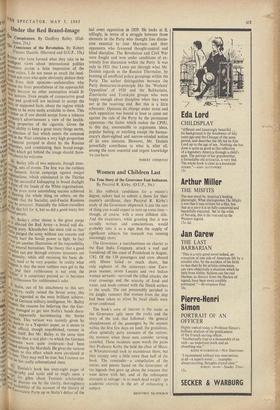t y 44 Conscience of the Revolution. By Robert y01,L E
who have formed what they take to be
' Aei intelligent . lgent views about international politics It d '°e.luetinfes accept a false impression of the ilocr,s, imLyiet rulers. I do not mean so much the Intel- ita P rtkla 1 sub-men who quite obviously deduce their chiol,t,:ers from their opinions—unilateralists who piattl ssume the basic peacefulness of the apparatchik beel t,irII,Ply because no other assumption would Bt ueir • ,, notions. Even people of comparative good beet rose and good-will are inclined to accept the In tt`r hacts, or supposed facts, about the regime which t Pre: i, PPeo to be most easily available to them. This 6Yhicf e' rather as if one should accept from a tobacco d a QMPany's advertisement a view of the health- y P''
Ai givi"
sp .46 properties of the cigarette. Given the Irani th vlet ability to keep a great many things secret, isiotl' poe selection of fact which enters the common 1p13" of°1 in the West contains a very high proportion whet? ,, material pumped in direct by the Russian e add4t4othorities, and constituting their brand-image. irosts Oks which get behind the image should there- Eol "re always be welcome.
ighV Nir 13 • ,b6 loci., • alley tells of two separate, though inter- : n ifr 414'418, sets of events. The first was the ruthless s,d nt, fantastic Soviet campaign against émigré 3F351 wi8tLanisations, which culminated in the Thirties tho le Paris the successful kidnapping in broad daylight :s Lao: dvraris of the heads of the White organisations. - r or ,e ',the even more astonishing success achieved 1 y„.111 blaming the whole thing on others, on the s " , ()ands that the Socialist, anti-Fascist Russians eny , . ,4 i be innocent. Naturally the fellow-travellers itfy• (I the ue day fell for it, but so did a good many less sed People.
Mr. B • ..
,, M ,. . alley s other theme is the great purge affected the Red Army—a brutal anli dis- tusti„ ,, %ten& story. Khrushchev has since told us that' , teve"..11 Purged the army. without any reasons and \ ' it„,ielY hurt the Soviet power to fight. In fact 1 teas Yet another illustration of the impossibility 1 11 amoral humanism. The theory that a good ef necessity, can put through extreme measures out 0 "eeessity, while still retaining his basic de- happens used to be very popular. In reality what , i;Peos is that the most ruthless men get to the ,e3d real. aoli their ruthlessness is not even the ilia gum IslW it is sometimes praised as—it becomes ruthlessness for ruthlessness's sake. 2iiiti if iolc. nt Stalin, out of his attachment to this sort s to plia„4ctivitY, really ruined the Soviet army, this • •'.'nt ' be regarded as the most brilliant achieve-
. ent j i his in. of Geran military intelligence. Mr. Bailey
law, Man hereasons for believing that the Ger- a01,.nten", managed to get into Stalin's hands docu- ,uslY0141,1 apparently incriminating the Soviet :a10'' ktr.snals. This version was recently given by 3 av,. 1, Surkov to a Yugoslav paper, so it seems to "v the .e official, though unpublished, rumour in nlalsla itself. But Mr. Bailey at the same time tie:tains that a real plot—to which the German , to Ments were quite irrelevant—had been Id' hi tinedamong the Marshals. He gives the various -1 the 1%,„.urs to this effect which were circulated at ,ear 





































 Previous page
Previous page